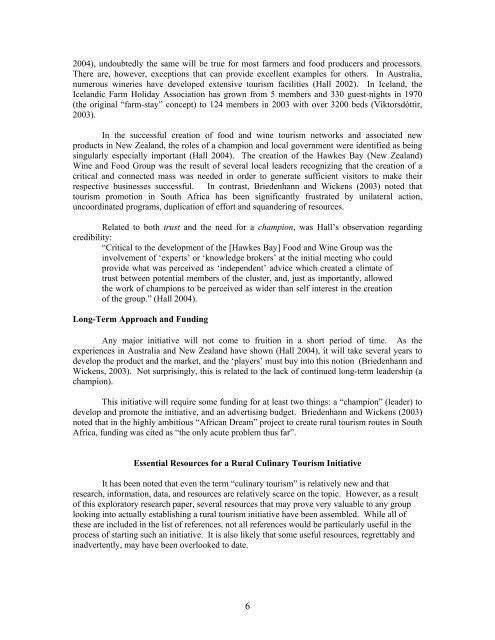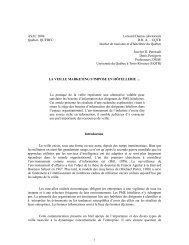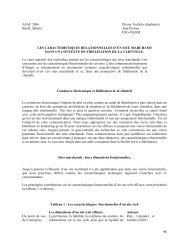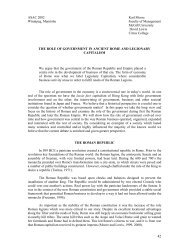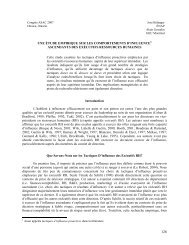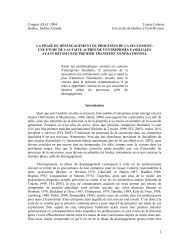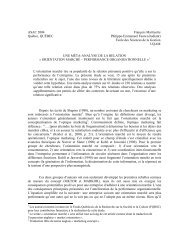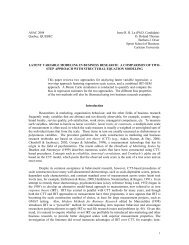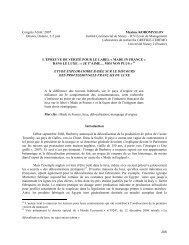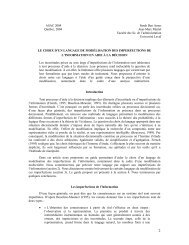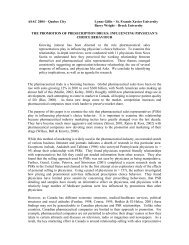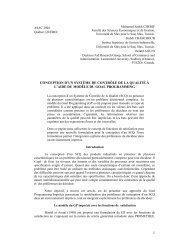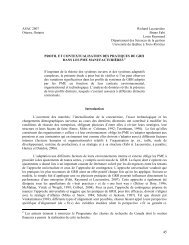ASAC 2004 Iain Murray Quebec (Quebec) School of Hospitality and ...
ASAC 2004 Iain Murray Quebec (Quebec) School of Hospitality and ...
ASAC 2004 Iain Murray Quebec (Quebec) School of Hospitality and ...
You also want an ePaper? Increase the reach of your titles
YUMPU automatically turns print PDFs into web optimized ePapers that Google loves.
<strong>2004</strong>), undoubtedly the same will be true for most farmers <strong>and</strong> food producers <strong>and</strong> processors.<br />
There are, however, exceptions that can provide excellent examples for others. In Australia,<br />
numerous wineries have developed extensive tourism facilities (Hall 2002). In Icel<strong>and</strong>, the<br />
Icel<strong>and</strong>ic Farm Holiday Association has grown from 5 members <strong>and</strong> 330 guest-nights in 1970<br />
(the original “farm-stay” concept) to 124 members in 2003 with over 3200 beds (Viktorsdóttir,<br />
2003).<br />
In the successful creation <strong>of</strong> food <strong>and</strong> wine tourism networks <strong>and</strong> associated new<br />
products in New Zeal<strong>and</strong>, the roles <strong>of</strong> a champion <strong>and</strong> local government were identified as being<br />
singularly especially important (Hall <strong>2004</strong>). The creation <strong>of</strong> the Hawkes Bay (New Zeal<strong>and</strong>)<br />
Wine <strong>and</strong> Food Group was the result <strong>of</strong> several local leaders recognizing that the creation <strong>of</strong> a<br />
critical <strong>and</strong> connected mass was needed in order to generate sufficient visitors to make their<br />
respective businesses successful. In contrast, Briedenhann <strong>and</strong> Wickens (2003) noted that<br />
tourism promotion in South Africa has been significantly frustrated by unilateral action,<br />
uncoordinated programs, duplication <strong>of</strong> effort <strong>and</strong> squ<strong>and</strong>ering <strong>of</strong> resources.<br />
Related to both trust <strong>and</strong> the need for a champion, was Hall’s observation regarding<br />
credibility:<br />
“Critical to the development <strong>of</strong> the [Hawkes Bay] Food <strong>and</strong> Wine Group was the<br />
involvement <strong>of</strong> ‘experts’ or ‘knowledge brokers’ at the initial meeting who could<br />
provide what was perceived as ‘independent’ advice which created a climate <strong>of</strong><br />
trust between potential members <strong>of</strong> the cluster, <strong>and</strong>, just as importantly, allowed<br />
the work <strong>of</strong> champions to be perceived as wider than self interest in the creation<br />
<strong>of</strong> the group.” (Hall <strong>2004</strong>).<br />
Long-Term Approach <strong>and</strong> Funding<br />
Any major initiative will not come to fruition in a short period <strong>of</strong> time. As the<br />
experiences in Australia <strong>and</strong> New Zeal<strong>and</strong> have shown (Hall <strong>2004</strong>), it will take several years to<br />
develop the product <strong>and</strong> the market, <strong>and</strong> the ‘players’ must buy into this notion (Briedenhann <strong>and</strong><br />
Wickens, 2003). Not surprisingly, this is related to the lack <strong>of</strong> continued long-term leadership (a<br />
champion).<br />
This initiative will require some funding for at least two things: a “champion” (leader) to<br />
develop <strong>and</strong> promote the initiative, <strong>and</strong> an advertising budget. Briedenhann <strong>and</strong> Wickens (2003)<br />
noted that in the highly ambitious “African Dream” project to create rural tourism routes in South<br />
Africa, funding was cited as “the only acute problem thus far”.<br />
Essential Resources for a Rural Culinary Tourism Initiative<br />
It has been noted that even the term “culinary tourism” is relatively new <strong>and</strong> that<br />
research, information, data, <strong>and</strong> resources are relatively scarce on the topic. However, as a result<br />
<strong>of</strong> this exploratory research paper, several resources that may prove very valuable to any group<br />
looking into actually establishing a rural tourism initiative have been assembled. While all <strong>of</strong><br />
these are included in the list <strong>of</strong> references, not all references would be particularly useful in the<br />
process <strong>of</strong> starting such an initiative. It is also likely that some useful resources, regrettably <strong>and</strong><br />
inadvertently, may have been overlooked to date.<br />
6


